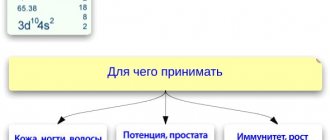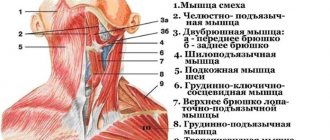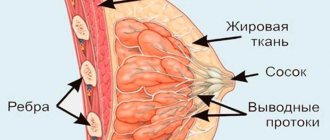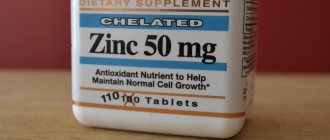Zinc[edit | edit code]
Foods rich in zinc
Zinc
is an important trace element, a metal that has a wide range of biological effects.
It takes part in the immunological reactivity of the body, the synthesis of adrenal hormones and sex hormones, spermatogenesis[1][2].
Large-scale studies emphasizing the importance of zinc in immune responses began in the 1980s. Today its important role in the stabilization of cytomembranes and the ability of a polyclonal activator of T-lymphocytes is known.
Zinc is part of the hormone insulin, which is involved in carbohydrate metabolism, is contained in a number of other important enzymes, is involved in the processes of hematopoiesis, in the photochemical reactions of the vision process, and in the activity of the endocrine glands.
Zinc in food.
Contained in liver, meat, chicken egg yolks, cheese, legumes, vegetables, especially in nuts (walnuts, almonds, Brazil).
Biological role of zinc
This substance is a silvery-white metal. At room temperature, zinc is quite brittle, but if it is heated to a temperature of 100-150 degrees, it becomes ductile. It is impossible to find zinc in its pure form in nature, but there are quite a lot of different compounds, the most common of which are: sphalerite, calamite, etc. Various alloys of this metal have long been used by mankind. The most famous of them, brass (an alloy of zinc and copper) was known to the healers of Ancient Egypt. They noticed that this trace element promotes rapid wound healing. Brass products were also found in the settlements of Babylon and Assyria. But the biological role of zinc became of interest to scientists only in the 30s of the last century. Modern experts often call this mineral “good and evil in one bottle,” since on the one hand it restores damaged tissues and heals wounds, and on the other hand it promotes the proliferation of malignant cells that provoke cancer.
Hypocincosis[edit | edit code]
Source:
“Pharmacological support of sports activities”
.
Author
: Professor Makarova G.A.
Ed.
: Soviet sport, 2013.
With zinc deficiency, various lesions of the skin and mucous membranes occur - dermatitis, baldness, parakeratosis. In children, growth is delayed, dwarfism and delayed puberty may develop. With an excess of zinc, anemia develops.
Hypozincosis often develops with a diet consisting primarily of unleavened bread made from whole wheat, rich in phytin and fiber. Yeast fermentation occurring in conventional sour dough significantly increases the physiological availability of zinc in wheat bread.
Under natural conditions, the appearance or worsening of zinc deficiency occurs with increased levels of calcium, phosphorus and phytic acid in the diet, which form poorly utilized protein-phytic complexes and thus contribute to the development of zinc deficiency in the body. Diets high in acidic foods can also contribute to a negative zinc balance. Manifestations of its deficiency in the body are enhanced by zinc antagonists - copper and cadmium.
There is currently no common point of view regarding the zinc status of athletes. But there are many studies where zinc deficiency has been established against the background of loads aimed at developing endurance.
Thus, F. Couzy et al.[3] When studying the cumulative effect of physical activity, they found that the plasma zinc content decreases significantly after 5 months of intense training.
According to N. Ohno et al.[4], 10 weeks of physical training causes a noticeable decrease in circulating zinc exchangeable in the blood.
According to RA Anderson [5], after a 6-mile run, there is a 1.5-fold increase in urinary zinc excretion. A comparison of this information with nutritional records suggests that many athletes are experiencing zinc deficiency.
As for studying the relationship between zinc status and its additional consumption and physical performance, such studies are rare, quite problematic and not conducted on highly qualified athletes [6][7]. There is no significant relationship between zinc content in blood plasma and MIC.
Additional intake of zinc at 135 mg for 14 days only contributes to an increase in static endurance. No such changes occur in the parameters of dynamic endurance.
According to the authors, zinc may influence the efficiency of anaerobic work, accompanied by high lactate production, but this assumption needs serious substantiation.
To eliminate zinc deficiency, use zinc oxide (internally and externally for enteropathic acrodermatitis), valerian zinc in combination with valerian extract, valerian zinc in combination with camphor in gelatin capsules or 0.25% solution of zinc sulfate.
I would like to emphasize once again that in all cases of prescribing zinc preparations, one should keep in mind their dose-dependent effect: for the normal functioning of enzyme systems, only a certain amount of this ion is required; its excess content leads to cell damage and disruption of processes dependent on it.
Zinc to strengthen the immune system[edit | edit code]
A study that received a lot of attention was conducted at the Cleveland Clinic in 1996. Subjects who started taking zinc tablets within 24 hours of the onset of symptoms got rid of their “cold” in an average of 4.5 days. The placebo group experienced symptoms for 7.5 days. However, subsequent studies with children did not confirm these results (Macknin et al., 1998). It should be assumed that to achieve a beneficial effect, zinc supplements must be taken within 24 hours of the onset of symptoms. Long-term use of supplements is not advisable, as side effects are possible, as well as a decrease in the content of high-density lipoproteins (cholesterol), suppression of the function of the immune system and the occurrence of an obstacle to the absorption of copper, and this is fraught with microcytic anemia. It is believed that zinc in tablet form can act locally on the upper respiratory tract.
In a study published in The Open Respiratory Medicine Journal, Dr. Harry Hemila from the University of Helsinki, Finland, analyzed 13 experiments using zinc lozenges and a placebo control group to evaluate the effect of zinc on respiratory infection. The results of three studies showed that zinc acetate at a dosage of more than 75 mg/day reduces the time of a “cold” by an average of 42%. The results of 5 experiments using other zinc salts at the same dosage indicated a reduction in the duration of the “cold” by 20%, and another 5, where the dosage was less than 75 mg/day, indicated the absence of any effect.
Most of the discrepancies in this study are related to the daily dose of zinc in the lozenges, says Dr. Hemila: if we consider only those experiments in which the dose was quite high, then the conclusion is clear and the possibility of significantly reducing the duration of the “cold” is clear. An important fact: lozenges do not need to be swallowed. Slowly dissolving, they provide a significantly better therapeutic effect.
Zinc in bodybuilding[edit | edit code]
Zinc is important when gaining muscle mass, as it is part of anabolic hormones, on which the result in bodybuilding largely depends. In addition, scientists have determined that zinc is consumed in large quantities during sports, and the diet of athletes, as a rule, contains insufficient amounts of zinc. These two circumstances dictate the need for additional zinc intake in the form of supplements and vitamin-mineral complexes.
Zinc is part of the ZMA anabolic complex.
Recommended doses of zinc[edit | edit code]
The daily requirement for zinc is 5-10 mg; in bodybuilding, doses increase to 30 mg per day.
When did the discovery of zinc occur?
Even in ancient times, people used zinc ointment to cure skin diseases. In ancient Egypt, it was added to potions to heal wounds. But scientists do not know the exact date when zinc was discovered. For a long time it was not possible to obtain this substance in its pure form. The fact is that this required calcining the ore at a temperature of 1200 degrees so that all inclusions and accompanying substances would burn out. But at a temperature of 1180 degrees, zinc begins to boil and evaporate.
They learned to isolate this metal in its pure form around the 11th century, in China. Local inventors have come up with a simple and effective method. The ore was placed in clay pots and tightly closed, then the pots were stacked in a pyramid, in which all the voids were filled with coal, and the coal was set on fire. The temperature inside the pyramid was so high that the pots became red hot. After the pots cooled down, zinc ingots were taken out of them. This substance was obtained in a similar way in India.
In Europe, they learned to obtain zinc only in the 15th-16th centuries, and before that it was imported from China and India. The task of researchers of that time was to learn how to obtain zinc metal in the simplest and most convenient way. The first to patent his method for producing zinc in the 18th century was the German chemist Andreas Marggraff, who studied many minerals.
Although zinc was already used in industry and medicine, they began to seriously study its properties only in the middle of the 20th century. The impetus for this process was the results of one of the studies. Its essence was as follows: rats that received burns were divided into several groups. At the same time, various substances were added to the food of each of them. As a result, it turned out that in rats that received zinc powder with food, their burns healed much faster.
By the way, this word “zincum” was first mentioned in the works of the legendary physician Paracelsus. It was first introduced into the Russian language by Lomonosov. And the study of the influence of this metal on the human body began only in the 1930s.
Zinc for the athlete[edit | edit code]
Zinc, one of the antioxidant minerals, is essential for hundreds of processes in the body, including maintaining normal function of taste and smell receptors, regulating growth, and promoting wound healing.
After doing my own research, I found that female bodybuilders, in particular, do not get enough zinc. Zinc is an important mineral for people under intense physical activity. During exercise, zinc helps cleanse the blood of lactic acid that accumulates in it. In addition, zinc supplementation (25 mg per day) protects the immune system during periods of intense physical activity.
There is not much scientific evidence regarding the effects of zinc supplementation on athlete performance. One scientific experiment showed interesting results: if you are an athlete whose sport requires increased endurance, and your diet includes a high amount of carbohydrates and a small proportion of protein and fat, you may be at risk of zinc deficiency, which can lead to too much weight loss, increased fatigue and poor results.
However, excessive zinc intake can also be harmful. In this case, it is possible to lower the level of good cholesterol (HDL) and, as a result, increase the likelihood of developing cardiovascular disease. Moreover, excessive amounts of zinc over a long period of time can lead to an imbalance in mineral balance and cause undesirable changes in two substances involved in calcium metabolism: calcitonin, a hormone that increases calcium stores in bones by extracting it from soft tissues, and osteocalcin, an essential non-collagenous protein necessary for strengthening bones.
By eating zinc-rich foods, you can get the amount of zinc you need—8 mg per day for women and 11 mg per day for men. The best sources of zinc are meat, eggs, seafood (especially oysters) and whole grains. If you've limited your meat intake, taking a daily multivitamin can help fill in nutritional gaps.
When to suspect zinc deficiency
The combination of a number of symptoms should lead you to think about a lack of zinc in the body. These include:
- decreased immunity;
- anemia;
- weakness and fatigue;
- hair loss and brittle nails;
- decreased potency and libido in men;
- slow growth of muscle mass.
If you notice a number of the listed symptoms, you should consult with your club’s sports doctor.
There are many arguments for increasing your zinc intake. But how high is a person's daily zinc intake really? However, anyone who regularly trains for strength training or other sports not only has an increased need for zinc itself, but also loses some zinc in the body. Therefore, supplemental zinc intake can be very beneficial for strength training athletes.
But what can you expect from zinc supplements? The thing is, if you look at the current research results, disappointment sets in very quickly. It is clear that higher zinc intake does not have a positive effect on testosterone balance and therefore not on our strength training performance. Therefore, the idea of gaining strength noticeably by increasing your zinc intake can be put aside very quickly. Additionally, you need to be careful because too much zinc in the body can interfere with the absorption of other micronutrients such as iron.
Sources[edit | edit code]
- Kukhtevich A.V. and others. Zinc and parlodel: possibilities for treating growth retardation and sexual development in nephropathies in adolescents // Ter. archive. - 1989. - T. 61. - No. 10. - P. 106-112.
- Tadzhiev F.S. Microelements in the pathogenesis and treatment of chronic bronchitis (clinical and experimental study) // Ter. archive. - 1991. - Ha 3. - P. 68-70.
- Corny F., Lafargue P., Guezennec CY Zinc metabolism in the athlete: Influence of training nutrition and other factors // Int. J. Sports Med. -1990. - Vol. 11. - P. 263-266.
- Ohno H. et al. Training effects on blood zinc levels in humans // J. Sports Med. and Phys. Fitness. - 1990. - Vol. 30. - P. 247-253.
- Anderson R.A. Selenium, chromium and manganese. B. Chromium // Modern nutrition in health and disease / eds. by M.E. Shils, V.R. Young. -Philadelphia: Lea and Febiger, 1988. - P. 268-277.
- Lukaski HC et al. Maximum oxygen consumption as related to magnesium, copper and zinc nutrition //Am. J. Clin. Nutr. — 1983. -Vol. 37. - P. 407-415.
- Krotkiewsky M. et al. Zinc and muscle strength and endurance //Acta Physiol. Scand. - 1982. - Vol. 116. - P. 309-311.
Excess zinc
Food cannot cause an excess of zinc in the body. Its concentration in products is less than the daily norm. Scientists have also found that there is a paradox: the more zinc in a product, the worse it is absorbed. The most common causes of an overdose of this microelement are:
- uncontrolled intake of vitamins, medications and dietary supplements;
- poisoning by vapors of zinc compounds;
- disruption of the metabolism of this mineral in the body.
Medicines and dietary supplements become dangerous to human health if they contain 150-200 mg of zinc. If the drug is taken for a long time, then smaller doses of the mineral can become toxic, in which case chronic zinc poisoning is formed. By the way, the body can become intoxicated as a result of eating food prepared or stored in galvanized containers.
People working in the production of metals, glass, paper, various dyes and dental cement are at risk. Associated substances of such productions are: zinc oxide, sulfate and chloride. These compounds are harmful to humans.
Excess zinc most strongly affects the functioning of the pancreas and stomach; the kidneys, liver, lungs, bone and muscle tissue are also affected. First of all, of course, the pancreas suffers: its tissues degenerate into fibrous tissue. For this reason, malfunctions in the functioning of this organ occur, the synthesis of insulin becomes difficult, which becomes the cause of the development of diabetes mellitus.
It should be noted that acute zinc poisoning occurs when a large amount of the substance enters the body in a short period of time. The following symptoms occur:
- nausea and vomiting;
- respiratory failure;
- stomach pain;
- strong thirst;
- sweetish taste in the mouth;
- cough and suffocation.
If zinc salts are ingested through the mouth, a burn to the esophagus and a metallic taste in the mouth occurs. When zinc poisoning is chronic, a secondary deficiency of iron, copper and manganese may occur, as the mechanism of their absorption is disrupted. Another symptom of an overabundance of a microelement can be a violation of mineralization in bone tissue, and this, in turn, impedes bone growth. We add that conditions of acute and chronic zinc poisoning require treatment and hospitalization.
What are the best zinc supplements?
One zinc supplement that has become very popular is zinc monomethionine aspartate (ZMA). The drug that is recommended to improve sleep quality is a combination of zinc, magnesium and vitamin B6. Since zinc is vital for maintaining normal testosterone levels, ZMA is often recommended as a testosterone booster, which helps meet the body's magnesium and zinc needs. The scientific opinion on this issue cannot be called unambiguous. While some experiments confirm an increase in testosterone levels when taking ZMA, others suggest that there is no statistically significant difference compared to placebo.
But one of the latest studies reported that after an 8-week course of zinc supplementation, the antioxidant capacity of tissues significantly increased in a group of subjects. Changes at the cellular level included increased levels of enzymes responsible for neutralizing the toxic effects of free radicals. In addition, supplementation may result in a moderate reduction in the activity of substances that can induce and enhance inflammation. However, any multivitamin complex gives a similar effect.
Zinc in bodybuilding
Zinc is a macroelement that in the human body takes part in protein synthesis, copying of genetic material, hematopoiesis, functioning of the immune and endocrine systems, and acts as a cofactor for several hundred zinc-dependent enzymes.
Zinc is important when gaining muscle mass, as it is part of anabolic hormones, on which the result in bodybuilding largely depends. In addition, scientists have determined that zinc is consumed in large quantities during sports, and the diet of athletes, as a rule, contains insufficient amounts of zinc. These two circumstances dictate the need for additional zinc intake in the form of supplements and vitamin-mineral complexes.
The role of zinc in the body
Zinc is one of the vital microelements. It is necessary for the normal functioning of any cell in the body. Normally, the human body should contain about 2-3 g of zinc. Most of it is found in the skin, liver, kidneys, retina, and in men, also in the prostate gland. Zinc is part of enzymes and complexes that provide the most important physiological functions of the body:
- formation, growth and metabolism (metabolism) of cells, protein synthesis, wound healing;
- activation of immune reactions directed against bacteria, viruses, tumor cells;
- absorption of carbohydrates and fats;
- maintaining and improving memory;
- maintaining taste and olfactory sensitivity;
- ensuring the stability of the retina and the transparency of the lens of the eye;
- normal development and functioning of the genital organs.
Daily requirement for zinc
The daily requirement for zinc is 10-15 mg. The upper permissible level of Zinc intake is set at 25 mg per day. The daily requirement of the male body for zinc is greater than that of women and is 15–25 mg. Zinc deficiency can develop when there is insufficient intake of it in the body (1 mg/day or less).
Zinc is essential for normal growth and development, so the need for zinc increases during pregnancy. This need is generally small: about 100 mg for the entire period of pregnancy. This can be achieved with additional regular intake of zinc at a dose of 0.6 mg/day throughout pregnancy.
Sources of zinc
Vegetable
Nuts, grains, legumes, pumpkin seeds, mushrooms, cereals, garlic, cabbage, asparagus, apples, pears, plums, cherries, potatoes, beets, carrots.
Animals
Beef liver, meat, fish and seafood, milk, cheese, poultry, eggs.
Good day. I am again glad to welcome you to my sports page. Do you know the role of microelements in the metabolism of any organism? – I think so, because we live in the information age. But for an athlete they are also super important because they are an integral component on the path to success.
Today I would like to tell you about such an important chemical element as zinc, its role for an athlete and the problems that arise when it is deficient. And also how to take zinc for bodybuilding.
More interesting articles for chemists:











